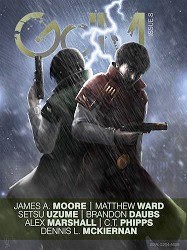 Grimdark Magazine #8, July 2016
Grimdark Magazine #8, July 2016
“Viva Longevicus” by Brandon Daubs
Reviewed by Nicky Magas
When Colonel Vilhous has had to drag himself across the galaxy for his kids, in “Viva Longevicus” by Brandon Daubs, the least they could do is show him some respect. But on the godforsaken planet Hawen with its dying settlements and killer, bio-engineered rat infestation, perhaps Vilhous’s relationship with his sons isn’t his biggest problem. When Nat gets himself stranded on the planet it’s up to Vilhous and his second son Kevin to rescue him, and maybe bury some ghosts of the past while they’re at it.
“Viva Longevicus” is a fairly straightforward narrative about the cyclical pattern of paternal aggression and its inevitable conclusion. Throughout the story, Vilhous complains about his disappointing sons and admits favoritism while withholding who his favorite is until a very well-timed reveal. The Rodentius Longevicus infestation is only a catalyst in the story, and could be replaced by any number of natural or engineered disasters. Where the story fails, I feel, is that the emotions and the relationships that are clearly the backbone of the story float unconnected to any larger event or idea. Vilhous’s anger seems only to be caused by his feelings for his own father which, if this is the case, is under-explored in the wider arc of the narrative.
For years Karelia has been forced to endure the brutal training of Captain Grel that subverts her deepest identities and leaves her haunted by the actions he forces her to take. But not anymore. In “Burying the Coin” by Setsu Uzumé, Karelia has a plan to take down the infamous smuggler, once and for all. She’s prepared for everything in this double-cross. Everything except being asked to go along with him on the fake heist. Everything but the possibility that he might be concerned for her welfare.
Uzumé writes a decent story of betrayal and guilt that unfortunately has complex emotions described by an emotionless character. While Gel has a rich variety of flavors to his personality, Karelia, while struggling with her alliances, has very little. She is haunted by her first kill, discomfited by her act of betrayal, and put in danger of her life, yet the first person present voice explains all this very clinically, giving the reader little that is uniquely Karelia. The plot itself is solid and straightforward, with a nice tie up at the end that nearly alludes to a continuation of the story, to tempt readers further.
Allim aims to get rich off the blade of a sword in “A Proper War” by James A. Moore. He and his band of marauders are in the habit of taking what they want, when they want it, the consequences be damned. And when the odds are six to one there’s not much risk involved in their work—if they choose the right targets that is, and try not to make too many enemies along the way.
Moore attempts are made to write in blood a moralistic story about the wicked getting what’s coming to them. What the reader gets is a prolonged battle that is disconnected from the core element of the story. Too many characters, points of view, and events on the first two pages make the opening unclear, leading to confusion with the reader as to what is supposed to be the main focus of the story. The narrative is stylistically clunky, with a heavy reliance on blocky description. “A Proper War” does deliver in a fairly thrilling fight scene, but without a solid connection to the world or the characters, this one gem floats without purpose in the rest of the story.
For Eirbon, being a pawn in someone else’s political war is nothing new. As a herald and a javelin pilot for the Balanos clan, his missions can be direct or subtle, but always inevitably out of his control. In “The Price of Honour” by Matthew Ward, a particular piece of his family’s history is pinned against Eribon to get him to provoke the continuation of a war that he not only has no stake in, but that could cost him the lives of those he cherishes most.
The sheer amount of information contained in “The Price of Honour” begs it to be much longer than this short story allows. By necessity, Ward writes the story non-linearly, jumping back and forth between past and present to give the reader a general idea of the events that lead up to what is teased in the beginning. Unfortunately, this leaves many of the deeper levels of the political intrigue of Ward’s world unexplored, as the reader is only given a surface level of understanding before being whisked away to another timeline. Indeed, readers barely get more than a glance at the characters themselves before the story is concluded, without a deeper sense of accomplishment in its wake.